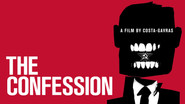ChanBot
i must have seen a different film!!
Listonixio
Fresh and Exciting
Kien Navarro
Exactly the movie you think it is, but not the movie you want it to be.
Fatma Suarez
The movie's neither hopeful in contrived ways, nor hopeless in different contrived ways. Somehow it manages to be wonderful
evanston_dad
"The Confession" is an uber-bleak film that stars Yves Montand as a loyal member of the Communist party who is turned on and made a scapegoat of when the party becomes paranoid about informers. He is imprisoned and systematically tortured until he admits to crimes against the party he didn't actually commit. Simone Signoret has a much smaller role as his wife, who sees her home invaded by Communist party thugs during the time in which her husband is in prison."The Confession" I think provides a good illustration of the pitfalls of Communism, which, despite its merits on paper, rarely works as an actual system. Those who adhere to it feel too persecuted to remain secure for long, and they turn against each other, convinced of double crossings and disloyalty to the party. It reminded me very much of the excellent novel "Darkness at Noon," which similarly examines the ways in which Communism eventually falls apart in practice.I can't say I necessarily enjoyed "The Confession." It's extremely one-note; the film doesn't really have much of a dramatic arc. It's not able to marry the qualities of political expose and thriller the way another of director Costa-Gavras's classics, "Z," is. But I would still recommend it.Grade: B+
RanchoTuVu
I got dragged into this movie like the protagonist got dragged into the brutal, endless interrogation. Given the overall vapidity of most of today's films, this is a real diversion into the power that really lies beneath the surface of movies, the acting, the writing, directing, and most important the mood. The mood of this film drags you like it does the character played by Yves Montand, as he endures a two year interrogation by the people's republic. It's real historic as well, full of details about Titoists, Trotskyites, and anarchists and paranoia over the struggle to control the communist revolution. But Montand looks great as he endures an impressive variety of interrogation techniques.
gridoon2018
Costa Gavras followed up his greatest critical and commercial success, "Z", with this initially confusing but ultimately illuminating political drama (which predates, and resembles more than a little, both "Papillon" and "Midnight Express"). Occasionally it can be just as exhausting for the viewer as it is for Yves Montand's character; Gavras reaches into a whole bag of cinematic tricks, but cannot quite camouflage the repetitive nature of the story; on the whole, however, "The Confession" is a powerful, sad, enraging experience. Although some viewers who still believe in the socialist ideals are bound to hate it for what it exposes, it's still the work of a genuine socialist who grieves over what became of Lenin's revolution in Stalin's (and his successors') hands. Or, as the young Czechs' graffiti on the wall in the final shot says, "Lenin, wake up! They've gone crazy". *** out of 4.
Rodrigo Amaro
In "L'Aveau" Costa-Gavras breaks at once and for all in defending one political ideology and attacking the other, like he did in "Z". This time he goes to show that both sides have their problematic aspects, they all make severe mistakes, we can't know which was good and which was bad. The bottom of line is that both with capitalism and communism someone decent always had to pay the prize for trying to do the right thing.Yves Montand plays the victim once again (murdered in "Z" and arrested by militants in "Etat de Siege" closing the combative Gavras political trilogy, "Missing" goes as an addendum, made years later after those films), a Czech and Communist vice-minister who'll be arrested and suffer on the hands of other members of the party who consider him a traitor of their cause. They believe he was a spy who had connections with American officials and all they want is a full confession of his crimes, which never existed, never happened (and they know that!), using of mental and physical methods to achieve results with the prisoner. The confession extraction is the real purpose to be visualized in here, exploited in painful and realistic details, methods used by the Communist - I recalled some of the descriptions made by Soljenitsin in "Gulag Archipelag", released on the same year as "L'Aveau" - like privation of sleep, keep marching at all times inside of the cell, and many other horrible techniques they used on prisoners during months and years if possible in order to break their resistance and confess everything, real or not.We have to give plenty of credit to Montand during those scenes, which are not few. Definitely not an easy shooting to make, you feel his exhaustion, weakening each frame goes by, the visible weight-loss, he went to extremes very few actors can reach and no, this isn't much method acting, one does not go in training method for those scenes, he just put himself there at each sequence. It doesn't go well for the character and it sure does not go well with the audience. It's hard to watch since the brutality and the frequency everything happens is so repetitive as if Gavras was trying to make the people in the audience to break out from the movie when in fact he's just being real with the events, causing some stir in us to the point where we ask ourselves how come this guy is not guilty of treason. In this manifest against the totalitarianism, the writer and director seemed to not making of the Socialists the almost heroes they were in "Z", while investigating the assassination of the popular leader. Their destructive paranoia, the unsubstantial suspicion they had with their own members, it's all a smoke curtain to hide the flaws of bigger people working on the Party and to hide the failures of a deeply flawed and inconsistent regime. Authentic, honorable and well-acted in all possible ways, just not much easy to endure. But truthful, powerful, haunting and rewarding nonetheless. 9/10




